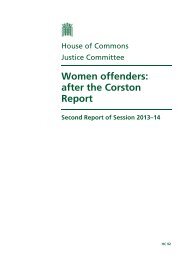Minority voices: Research into the access and acceptability of ... - MMC
Minority voices: Research into the access and acceptability of ... - MMC
Minority voices: Research into the access and acceptability of ... - MMC
- No tags were found...
Create successful ePaper yourself
Turn your PDF publications into a flip-book with our unique Google optimized e-Paper software.
• The breakdown <strong>of</strong> whe<strong>the</strong>r some Black <strong>and</strong> minority ethnic groups are over or underrepresented for conditions such as ADHD.• The collection <strong>of</strong> data based on more specific categories ra<strong>the</strong>r than <strong>the</strong> ‘catch all’census groupings.• To ga<strong>the</strong>r data broken down by ethnicity, take up <strong>of</strong> CAMHS, type <strong>of</strong> intervention<strong>of</strong>fered <strong>and</strong> attendance rates.• To design more young person friendly forms for <strong>the</strong> ga<strong>the</strong>ring <strong>of</strong> feedback data.• A more consistent approach to data ga<strong>the</strong>ring across agencies, to support inter-agency<strong>and</strong> partnership working.• Greater attention to process, ra<strong>the</strong>r than <strong>the</strong> current focus on inputs <strong>and</strong> outcomes(which reflects what funders generally want).A key <strong>the</strong>me here was that it is not <strong>the</strong> collection <strong>of</strong> data that is <strong>the</strong> problem butunderst<strong>and</strong>ing it <strong>and</strong> <strong>the</strong>n using it to develop <strong>and</strong> refine service provision.! Interpreting supportThe main suggestions here were for interpreting support to be more widely available, forinterpreters to receive training about mental health <strong>and</strong> also, wherever possible, for services towork with <strong>the</strong> same interpreters to facilitate continuity <strong>of</strong> approach to <strong>the</strong> family/youngperson.It was also suggested that options for undertaking simultaneous translations <strong>and</strong> interpretingshould be explored on <strong>the</strong> basis that <strong>of</strong>ten <strong>the</strong> current approach is not conducive to <strong>the</strong>rapybecause <strong>the</strong>re are frequent delays between <strong>the</strong> client speaking, <strong>the</strong> interpreter translating, <strong>the</strong><strong>the</strong>rapist responding <strong>and</strong> this being translated back to <strong>the</strong> client.! Staff recruitment, training <strong>and</strong> supportWhilst acknowledging <strong>the</strong> difficulties <strong>of</strong> recruiting greater numbers <strong>of</strong> staff from Black <strong>and</strong>minority ethnic groups, a prominent <strong>the</strong>me in <strong>the</strong> interviews with staff is that this issue needsto be prioritised if any improvement is to be made.Staff also emphasised that improvements to existing training <strong>and</strong> <strong>the</strong> provision <strong>of</strong> regular,experienced management support would help to improve staff confidence in this area, notleast by removing <strong>the</strong> sense many staff have <strong>of</strong> it being ‘up to <strong>the</strong>m’ to find <strong>the</strong> help <strong>and</strong>advice <strong>the</strong>y need.Identified training needs included:• Cross-cultural communication <strong>of</strong> distress.• Engagement skills.• Challenging personal views, impressions <strong>and</strong> attitudes.• Information about how <strong>the</strong>rapeutic models, <strong>the</strong>ories <strong>and</strong> approaches can be adapted tomeet <strong>the</strong> needs <strong>of</strong> clients from Black <strong>and</strong> minority ethnic groups more effectively.• Information about client contexts such as religious needs <strong>and</strong> youth culture.• Information about local services.It was also noted that training should not be restricted to certain groups <strong>of</strong> staff but availableto all, with time release accordingly. Scheduling training more flexibly - for example holdingsome courses in <strong>the</strong> early evening or at weekends - was also proposed in order to make iteasier for some staff to attend.<strong>Minority</strong> Voices <strong>Research</strong> Report40
















